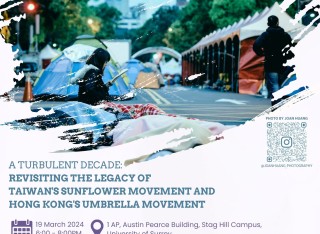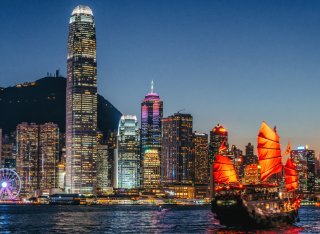
Dr Malte Philipp Kaeding
About
Biography
Malte Philipp Kaeding is Senior Lecturer in International Politics in the Department of Politics. Previously he lectured at the University of Heidelberg and Hong Kong Baptist University.
He is the co-founder and co-convenor of the Hong Kong Studies Association and an Associate Fellow of the European Research Center on Contemporary Taiwan, University of Tübingen. Malte is also the director and co-producer of a documentary film on Hong Kong.
University roles and responsibilities
- Director Postgraduate Taught Programmes
News
ResearchResearch interests
Malte researches emotions and international relations and is the director/writer/producer of the award-winning feature-length documentary Black Bauhinia 香港本色 on the Hong Kong localist movement.
Dr Kaeding works also on topics such as identity and social movements, elections and democratisation with a regional focus on East Asia and particularly the so-called 'Greater China area' with China, Macau, Hong Kong and Taiwan.
Research interests
Malte researches emotions and international relations and is the director/writer/producer of the award-winning feature-length documentary Black Bauhinia 香港本色 on the Hong Kong localist movement.
Dr Kaeding works also on topics such as identity and social movements, elections and democratisation with a regional focus on East Asia and particularly the so-called 'Greater China area' with China, Macau, Hong Kong and Taiwan.
Teaching
I teach undergraduate modules in International Political Economy, Politics of the Greater China Region, and States and Markets in East Asia; and a postgraduate module in International Political Economy.
Publications
The way leaders and citizens cope with stress is undertheorised in the study of international relations (IR). This article anchors psychological studies on coping to the literature theorising emotions in IR to clarify two unaddressed questions: (1) how do political actors – individuals and collectives cope with both sudden crises and long-term change?, and (2) in the context of international politics, whose coping matters, and under what conditions? Our coping framework demonstrates intersubjective appraisal of urgency from everyday stressors triggers a process that elevates individual coping to the collective level. Circulation of coping responses, a key but neglected process of scaling up, binds individuals to affective communities. Our theoretical contribution is an innovative coping framework to explore how individual pursuit of well-being is transformed into collective agency. The methodological novelty is the triangulation of emotional representation with survey data and in-depth interviews to capture the circulation of coping responses. We illustrate our conceptual framework with the overlooked case of Hong Kong. Our findings suggest coping constitutes conditions of political possibilities in that individual Hong Kongers' efforts to sustain emotional well-being is aggregated to create momentum for a state-building project unexpected by the former British colonisers or the Chinese Communist Party.
Purpose The purpose of this paper is threefold: first, to recount the scale, composition and agents of red capital in Hong Kong; second, to conceptualise the peculiarity of red capital; and third, to explore the impact of red capital on the political and economic institutional setup in Hong Kong. Design/methodology/approach The paper consults the comparative capitalism literature to conceptualise the phenomenon of red capital. The paper gathers data from Hong Kong Stock Exchange and indices to provide an overview of red capital. Furthermore, the case study of 2016 Legislative Election is deployed to investigate the mechanisms of red capital’s influence. The paper concludes with a summary of how red capital may challenge the validity of the “One Country, Two Systems” framework. Findings This paper argues that red capital replicates China’s state–capital nexus in Hong Kong and morphs the game of competition in favour of Chinese nationally controlled companies. In tandem with the emerging visibility of the party–state in Hong Kong’s economic sphere, the authors observe attempts of Chinese economic actors to compromise democratic institutions, deemed obstacles to state control. Originality/value This paper is the first attempt to systematically embed the discussion of red capital into comparative capitalism literature. This study provides conceptual tools to examine why red capital could pose a threat to liberal societies such as Hong Kong. Through this paper, we introduce a novel research agenda to scrutinise capital from authoritarian states and investigate how the capital is changing the political infrastructure shaped by liberal principles and values.
This book offers a selection of views from Chinese and European experts and scholars on the most pressing environmental challenges — air quality, global warming, climate change, energy security, urbanisation — faced by Europe and China ...
This article argues that the 2008 Presidential election campaign of the KMT candidate Ma Ying-jeou witnessed a shift in the identity content of the KMT concept of “New Taiwanese” from the civic side of the spectrum towards the ethnic side. In order to become electable, Ma Ying-jeou had to portray a very “Taiwanized” image. This suggests the strong impact of two decades of Taiwanization policies, focused on the ethnic and cultural realm, on the political market of Taiwan. The emergence of the “culturally enhanced” concept of “New Taiwanese” emphasizes the importance of cultural and ethnical discourses in national identity formation. After Ma’s election, his stance towards China has lacerated once again the conflict of identities that will continue to shape the future of the islands.
It has been taken for granted that a very unique Macao identity has been evolving after more than 450 years of Portuguese rule and cultural influence. Quantitative research, however, shows that in fact the majority of the Macao people are identifying themselves as Chinese. This paper analyzes the evolution of Macao’s identity along the lines of the ethno-cultural versus civic identity theoretical framework. A pilot study among some Macao students provides preliminary insights into the question of what constitutes Macao’s cultural identity. The structural difficulties of the development of the Macao identity and the possibility of an emerging civic identity are examined.





